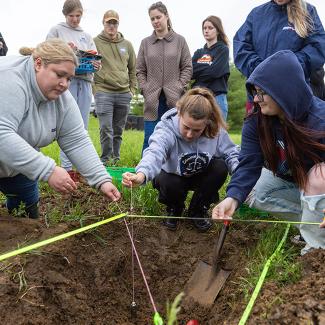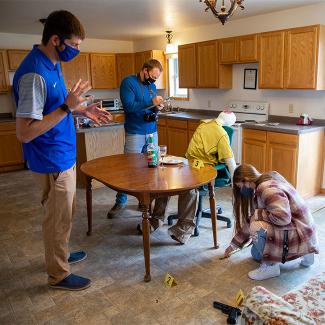What you'll learn as a forensic investigation major at UW-Platteville
If you’re fascinated by crime-solving and driven by curiosity, a forensic investigation degree from UW-Platteville could be your perfect match. With more opportunities for those ready to turn their passion for science and justice into a meaningful career.
At the University of Wisconsin-Platteville, you can earn a forensic science degree from one of just 49 universities nationwide to offer a dedicated bachelor’s in forensic investigation—and the only public university in Wisconsin to do so. This innovative program sits at the intersection of science, criminal justice, and investigative analysis, preparing students for roles in law enforcement, legal settings, and forensic labs.
The curriculum combines scientific theory with hands-on experience in crime scene investigation. You’ll practice collecting evidence, documenting scenes, and applying techniques used in forensic biology, forensic chemistry, and criminal investigation. Training takes place in cutting-edge facilities like the Forensic Investigation Crime Scene House and Research Facility, where you'll simulate real-life scenarios using the same tools and methods found in a forensic laboratory.
Whether you're interested in becoming a forensic scientist, crime scene investigator, or pursuing a graduate certificate, this forensic science program gives you the foundation and flexibility to reach your goals. It’s ideal for students who are analytical, observant, and eager to solve real-world mysteries using investigative science.
Launch Your Career in Forensic Science
Graduates of UW-Platteville’s forensic investigation program are well-prepared for a wide variety of careers, both at the scene and behind the scenes. Depending on your chosen emphasis area—Crime Scene, Laboratory, or Medicolegal Death Investigation—you can tailor your forensic science major to fit your career goals.
Possible paths include:
- Autopsy technician
- Crime scene investigator
- Criminalist
- DNA analyst
- Forensic biologist
- Forensic chemist
- Forensic science technician
- Forensic scientist
Throughout the program, students gain practical skills in forensic laboratory techniques, crime scene documentation, evidence analysis, and criminal investigation strategies. Experiential learning is at the core of the curriculum. You’ll simulate complex scenarios, analyze real forensic data, and even explore advanced techniques like drone-based aerial imaging and alternate light source detection.
In addition to coursework, UW-Platteville offers a nationally recognized internship program. These hands-on placements with local, state, and federal law enforcement agencies provide invaluable on-the-job training. Internships and faculty-led research experiences help students build competitive résumés for jobs or graduate school admission.
Small class sizes and expert faculty ensure that every student receives personalized mentorship. Many professors bring decades of forensic science and law enforcement experience into the classroom, offering insights you can’t get from a textbook.
Whether you're entering the workforce or considering advanced graduate programs, a forensic investigation degree from UW-Platteville gives you the skills, connections, and experience to succeed in the exciting world of forensic science.

Discover by Doing
Forensic Investigation at UW-Platteville is focused on experiential learning that connects your education to your future career.
Real-Life Skills Get You Hired
One of only a handful of its type in the country, the Forensic Investigation Crime Scene House at UW-Platteville lets you put your skills to use in realistic, simulated crime scenes and interrogations.
The Forensic Investigation Crime Scene House and the Forensic Investigation Research Facility—approximately one-and-a-half acres of fenced land on the FICSH property—provide opportunities for mock crime scene practicals, both indoors and outdoors. Under the supervision of faculty with real-life experience, you will apply what you've learned about crime scene processing, evidence collection, and documentation to get a sense of what it’s like to be at a crime scene.
Together, both facilities provide opportunities for you to work with faculty to conduct research on techniques and technologies used for crime scene investigation, such as the use of alternate light sources to locate bone, searching for clandestine graves using drone-based aerial imaging, and the effects of outdoor environments on fingerprints.
Program Overview
Forensic investigation is one of the fastest-growing specializations in the discipline of criminal justice, and UW-Platteville’s Department of Criminal Justice and Forensic Investigation is the first and only public institution of higher education in Wisconsin to grant a Bachelor of Science in Forensic Investigation. When pursuing a forensic investigation degree, you’ll learn investigative methods and crime-scene processing techniques such as fingerprint identification, crime-scene mapping, legal aspects, and forensic photography.
Enrolling in one of our forensic investigation programs means you’ll network with professionals and develop career skills through the university’s nationally recognized internship program as you work in local, state, or national agencies and departments while earning credit. Our active student organizations and clubs give you ample opportunities to make friends and build your resume. You can also apply the principles from our forensic investigation courses, such as recognizing, documenting, collecting, and preserving physical evidence in simulated crime scenes at UW-Platteville’s Forensic Investigation Crime Scene House.
Students who major in forensic investigation must choose an area of emphasis: Crime Scene, Laboratory, or Medicolegal Death Investigation. We also offer a minor in forensic investigation. We encourage students to pursue majors and/or minors in science (e.g., biology, chemistry) to expand their skill sets.






